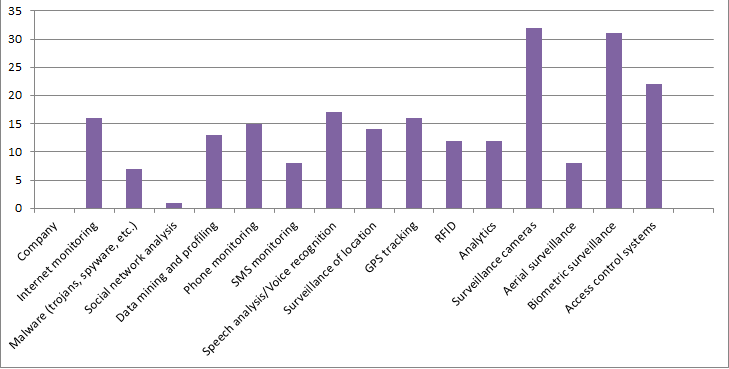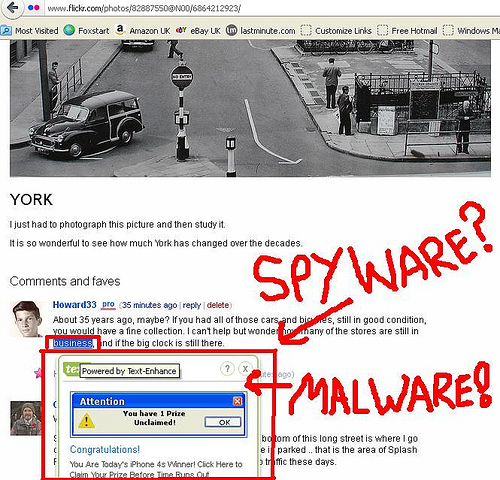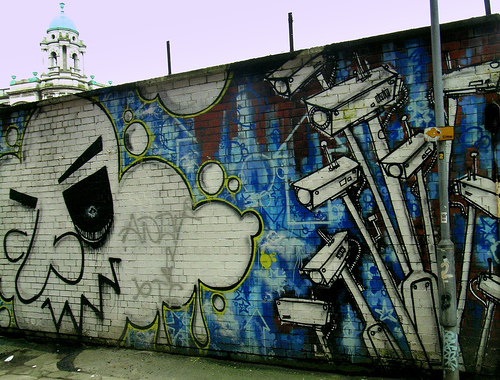The Surveillance Industry in India: At Least 76 Companies Aiding Our Watchers!
Maria Xynou is conducting research on surveillance technology companies operating in India. So far, 76 companies have been detected which are currently producing and selling different types of surveillance technology. This post entails primary data on the first ever investigation of the surveillance industry in India. Check it out!
This blog post has been cross-posted in Medianama on May 8, 2013. This research was undertaken as part of the 'SAFEGUARDS' project that CIS is undertaking with Privacy International and IDRC.
So yes, we live in an Internet Surveillance State. And yes, we are constantly under the microscope. But how are law enforcement agencies even equipped with such advanced technology to surveille us in the first place?
Surveillance exists because certain companies produce and sell products and solutions which enable mass surveillance. Law enforcement agencies would not be capable of mining our data, of intercepting our communications and of tracking our every move if they did not have the technology to do so. Thus an investigation of the surveillance industry should be an integral part of research for any privacy advocate, which is why I started looking at surveillance technology companies. India is a very interesting case not only because it lacks privacy legislation which could safeguard us from the use of intrusive technologies, but also because no thorough investigation of the surveillance industry in the country has been carried out to date.
The investigation of the Indian surveillance industry has only just begun and so far, 76 surveillance technology companies have been detected. No privacy legislation...and a large surveillance industry. What does this mean?
A glimpse of the surveillance industry in India
In light of the UID scheme, the National Intelligence Grid (NATGRID), the Crime and Criminal Tracking Network System (CCTNS) and the Central Monitoring System (CMS), who supplies law enforcement agencies the technology to surveille us?
In an attempt to answer this question and to uncover the surveillance industry in India, I randomly selected a sample of 100 companies which appeared to produce and sell surveillance technology. This sample consisted of companies producing technology ranging from internet and phone monitoring software to biometrics, CCTV cameras, GPS tracking and access control systems. The reason why these companies were randomly selected was to reduce the probability of research bias and out of the 100 companies initially selected, 76 of them turned out to sell surveillance technology. These companies vary in the types of surveillance technology they produce and it should be noted that most of them are not restricted to surveillance technologies, but also produce other non-surveillance technologies. Paradoxically enough, some of these companies simultaneously produce internet monitoring software and encryption tools! Thus it would probably not be fair to label companies as ´surveillance technology companies´ per se, but rather to acknowledge the fact that, among their various products, they also sell surveillance technologies to law enforcement agencies.
Companies selling surveillance technology in India are listed in Table 1. Some of these companies are Indian, whilst others have international headquarters and offices in India. Not surprisingly, the majority of these companies are based in India's IT hub, Bangalore.
Table 2 shows the types of surveillance technology produced and sold by these 76 companies.
The graph below is based on Table 2 and shows which types of surveillance are produced the most by the 76 companies.
 |
|---|
Graph on types of surveillance sold to law enforcement agencies by 76 companies in India
Out of the 76 companies, the majority (32) sell surveillance cameras, whilst 31 companies sell biometric technology; this is not a surprise, given the UID scheme which is rapidly expanding across India. Only one company from the sample produces social network analysis software, but this is not to say that this type of technology is low in the Indian market, as this sample was randomly selected and many companies producing this type of software may have been excluded. Moreover, many companies (13) from the sample produce data mining and profiling technology, which could be used in social networking sites and which could have similar - if not the same - capabilities as social network analysis software. Such technology may potentially be aiding the Central Monitoring System (CMS), especially since the project would have to monitor and mine Big Data.
On countless occasions I have been told that surveillance is an issue which concerns the elite and which does not affect the poorer classes, especially since the majority of the population in India does not even have Internet access. However, the data in the graph above falsifies this mainstream belief, as many companies operating in India produce and sell phone and SMS monitoring technology, while more than half the population owns mobile phones. Seeing as companies, such as ClearTrail Technologies and Shoghi Communications, sell phone monitoring equipment to law enforcement agencies and more than half the population in India has mobile phones, it is probably safe to say that surveillance is an issue which affects everyone, not just the elite.
Did you Know:
 |
|---|
CARLOS62 on flickr
- WSS Security Solutions Pvt. Ltd. is north India´s first CCTV zone
- Speck Systems Limited was the first Indian company to design, manufacture and fly a micro UAV indigenously
- Mobile Spy India (Retina-X Studios) has the following mobile spying features:
- SniperSpy: remotely monitors smartphones and computers from any location
- Mobile Spy: monitors up to three phones and uploads SMS data to a server using GPRS without leaving traces
4. Infoserve India Private Limited produces an Internet monitoring System with the following features:
- Intelligence gathering for an entire state or a region
- Builds a chain of suspects from a single start point
- Data loss of less than 2%
- 2nd Generation Interception System
- Advanced link analysis and pattern matching algorithms
- Completely Automated System
- Data Processing of up to 10 G/s
- Automated alerts on the capture of suspicious data (usually based on keywords)
5. ClearTrail Technologies deploys spyware into a target´s machine
6. Spy Impex sells Coca Cola Tin Cameras!
7. Nice Deal also sells Coca Cola Spy Cameras, as well as Spy Pen Cameras, Wrist Watch Cameras and Lighter Video Cameras to name a few...
8. Raviraj Technologies is an Indian company which supplies RFID and biometric technology to multiple countries all around the world... Countries served by Raviraj Technologies include non-democracies, such as Zimbabwe and Saudi Arabia...as well as post-revolutionary countries, such as Egypt and Tunisia... Why is this concerning?
- Non-democracies lack adequate privacy and human rights safeguards and by supplying such regimes with biometric and tracking technology, the probability is that this will lead to further oppression within these countries
- Egypt and Tunisia had elections to transit to democracy and by providing them biometric technology, this could lead to further oppression and stifle efforts to increase human rights safeguards
“I´m not a terrorist, I have nothing to hide!”
 |
|---|
r1chardm on flickr
It´s not a secret: Everyone knows we are being surveilled, more or less. Everyone is aware of the CCTV cameras (luckily there are public notices to warn us...for now). Most people are aware that the data they upload on Facebook is probably surveilled...one way or the other. Most people are aware that mobile phones can potentially be wiretapped or intercepted. Yet, that does not prevent us from using our smartphones and from disclosing our most intimate secrets to our friends, from uploading hundreds of photos on Facebook and on other social networking sites, or from generally disclosing our personal data on the Internet. The most mainstream argument in regards to surveillance and the disclosure of personal data today appears to be the following:
“I´m not a terrorist, I have nothing to hide!”
Indeed. You may not be a terrorist...and you may think you have nothing to hide. But in a surveillance state, to what extent does it really matter if you are a terrorist? And how do we even define ´risky´ and ´non-risky´ information?
Last year at the linux.conf.au, Jacob Appelbaum stated that in a surveillance state, everyone can potentially be a suspect. The argument “I´m not a terrorist, I have nothing to hide” is merely a psychological coping mechanism when dealing with surveillance and expresses a lack of agency. Bruce Schneier has argued that the psychology of security does not necessarily reflect the reality of security. In other words, we may feel or think that our data is secure because we consider it to ential ´non-risky´ information, but the reality of security may indicate that our data may entail ´risky information´ depending on who is looking at it, when, how and why. I disagree with the distinction between ´risky´ and ´non-risky´ information, as any data can potentially be ´risky´ depending on the circumstances of its access.
That being said, we do not necessarily need to disclose nude photos or be involved in some criminal organization in order to be tracked. In a surveillance society, we are all potentially suspects. The mining and profiling of our data may lead to us somehow being linked to someone who, for whatever reason, is a suspect (regardless of whether that person has committed an actual offence) and thus may ultimately end us up being suspects. Perhaps one of our interests (as displayed in our data), our publicly expressed ideas or even our browsing habits may fall under ´suspicious activity´. It´s not really an issue of whether we are involved in a criminal organisation per se or if we are disclosing so-called ´risky information´. As long as our data is being surveilled, we are all suspects, which means that we can all potentially be arrested, interrogated and maybe even tortured, just like any other criminal suspect.
But what fuels a surveillance society? How can law enforcement agencies mine such huge volumes of data? Many companies, such as the 76 listed in this research, equip law enforcement agencies with the technology to monitor the Internet and our phones, to deploy malware to our computers, to mine and profile our data on social networking sites and to track our vehicles and movement. A main reason why we currently live in a Surveillance State is because the surveillance industry is blooming and currently equipping law enforcement agencies with the technology to watch our every move. Thus companies producing and selling surveillance technologies play an essential role in maintaining the surveillance state and should be accountable for the implications their products have on individuals´ right to privacy and other human rights.
Surveillance technologies, however, are not the only factor which fuels a surveillance state. Companies produce technologies based on the market´s demand and without it, the surveillance industry would not exist. The market appears to demand for surveillance technologies because a pre-existing surveillance culture has been established which in turn may or may not have been created by political interests of public control. Nonetheless, surveillance appears to be socially integrated. The fact that some of the most profitable businesses in the world, such as 3M, produce and sell surveillance technologies, as well as the fact that, in most countries in the world, it is considered socially prestigious to work in such a company is minimum proof that surveillance is being socially integrated. In other words, companies should be accountable in regards to the technologies they produce and who they sell them to, but we should also take into consideration that the only reason why these companies exist to begin with is because there is a demand for them.
By not opposing to repressive surveillance laws, to the CCTV cameras in every corner, to surveillance schemes -such as NATGRID and the CMS in India- or by handing over our data, we are fuelling the surveillance state. Unlike Orwell's totalitarian state described in 1984, surveillance today does not appear to be imposed in a top-down manner, but rather it appears to be a product of both the Information Revolution and of our illusionary sense of control over our personal data. Our ´apathy´ enables surveillance laws to be enacted and companies to produce the technology which will aid law enforcement agencies in putting us all under the microscope. As easy as it would be to blame companies for producing surveillance technologies, the reality of surveillance appears to be much more complicated than that, especially if surveillance is socially integrated.
Yet, the reality in India is that at least 76 companies are producing and selling surveillance technologies and equipping law enforcement agencies with them. This is extremely concerning because India lacks privacy legislation which could safeguard individuals from potential abuse. The fact that India has not enacted a privacy law ultimately means that individuals are not informed when their data is collected, who has access to it, whether it is being processed, shared, disclosed and/or retained. Furthermore, the absence of privacy legislation in India also means that law enforcement agencies are not held liable and this has an impact on accountability and transparency, as it is not possible to determine whether surveillance is effective or not. In other words, there are currently absolutely no safeguards for the individual in India and simultaneously, the rapidly expanding surveillance industry poses major threats to human rights.
Not only does India urgently need privacy legislation to be enacted to safeguard citizens from potential abuse, but the use of all surveillance technologies should be strictly regulated now. As previously mentioned, some companies, such as Raviraj Technologies, are exporting biometric technology to non-democratic countries and to fragile states transitioning to democracy. This should be prevented, as equipping a country - which lacks adequate safeguards for its citizens - with the technology to ultimately control its citizens can potentially have severe effects on human rights within the country. Thus export controls are necessary to prevent the expansion of surveillance technologies to countries which lack legal safeguards for their citizens. This also means that there should be some restrictions to international companies selling surveillance technologies from creating offices in India, since the country currently lacks privacy legislation.
Surveillance technologies can potentially have very severe effects, such as innocent people being arrested, interrogated, tortured...and maybe even murdered in some states. Should they be treated as weapons? Should the same export restrictions that apply to arms apply to surveillance technologies? Sure, the threat posed by surveillance technologies appears to be indirect. But don't indirect threats usually have worse outcomes in the long run? We may not be terrorists and we may have nothing to hide...but we have no privacy safeguards and a massively expanding surveillance industry in India. We are exposed to danger...to say the least.

